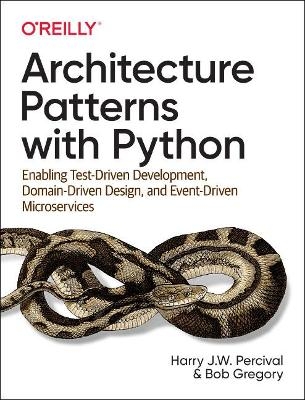
Architecture Patterns with Python
Enabling Test-Driven Development, Domain-Driven Design, and Event-Driven Microservices
Seiten
2020
O'Reilly Media (Verlag)
978-1-4920-5220-3 (ISBN)
O'Reilly Media (Verlag)
978-1-4920-5220-3 (ISBN)
With this practical guide, Harry Percival and Bob Gregory from MADE.com introduce proven architectural design patterns to help Python developers manage application complexity.
As Python continues to grow in popularity, projects are becoming larger and more complex. Many Python developers are taking an interest in high-level software design patterns such as hexagonal/clean architecture, event-driven architecture, and the strategic patterns prescribed by domain-driven design (DDD). But translating those patterns into Python isn’t always straightforward.
With this hands-on guide, Harry Percival and Bob Gregory from MADE.com introduce proven architectural design patterns to help Python developers manage application complexity—and get the most value out of their test suites.
Each pattern is illustrated with concrete examples in beautiful, idiomatic Python, avoiding some of the verbosity of Java and C# syntax. Patterns include:
Dependency inversion and its links to ports and adapters (hexagonal/clean architecture)
Domain-driven design’s distinction between Entities, Value Objects, and Aggregates
Repository and Unit of Work patterns for persistent storage
Events, commands, and the message bus
Command-query responsibility segregation (CQRS)
Event-driven architecture and reactive microservices
As Python continues to grow in popularity, projects are becoming larger and more complex. Many Python developers are taking an interest in high-level software design patterns such as hexagonal/clean architecture, event-driven architecture, and the strategic patterns prescribed by domain-driven design (DDD). But translating those patterns into Python isn’t always straightforward.
With this hands-on guide, Harry Percival and Bob Gregory from MADE.com introduce proven architectural design patterns to help Python developers manage application complexity—and get the most value out of their test suites.
Each pattern is illustrated with concrete examples in beautiful, idiomatic Python, avoiding some of the verbosity of Java and C# syntax. Patterns include:
Dependency inversion and its links to ports and adapters (hexagonal/clean architecture)
Domain-driven design’s distinction between Entities, Value Objects, and Aggregates
Repository and Unit of Work patterns for persistent storage
Events, commands, and the message bus
Command-query responsibility segregation (CQRS)
Event-driven architecture and reactive microservices
After an idyllic childhood spent playing with BASIC on French 8-bit computers like the Thomson T-07 whose keys go "boop" when you press them, Harry Percival spent a few years being deeply unhappy as a management consultant. Soon he rediscovered his true geek nature, and was lucky enough to fall in with a bunch of XP fanatics, working on the pioneering but sadly defunct Resolver One spreadsheet. He worked at PythonAnywhere LLP, spreading the gospel of TDD world-wide at talks, workshops and conferences. He is now with MADE.COM. Bob Gregory is a UK-based software architect with MADE.COM. He has been building event driven systems with domain-driven design for more than a decade.
| Erscheinungsdatum | 24.03.2020 |
|---|---|
| Verlagsort | Sebastopol |
| Sprache | englisch |
| Maße | 178 x 233 mm |
| Themenwelt | Mathematik / Informatik ► Informatik ► Web / Internet |
| ISBN-10 | 1-4920-5220-5 / 1492052205 |
| ISBN-13 | 978-1-4920-5220-3 / 9781492052203 |
| Zustand | Neuware |
| Informationen gemäß Produktsicherheitsverordnung (GPSR) | |
| Haben Sie eine Frage zum Produkt? |
Mehr entdecken
aus dem Bereich
aus dem Bereich
Schulbuch Klassen 7/8 (G9)
Buch | Hardcover (2015)
Klett (Verlag)
CHF 29,90
Buch | Softcover (2004)
Cornelsen Verlag
CHF 23,90


